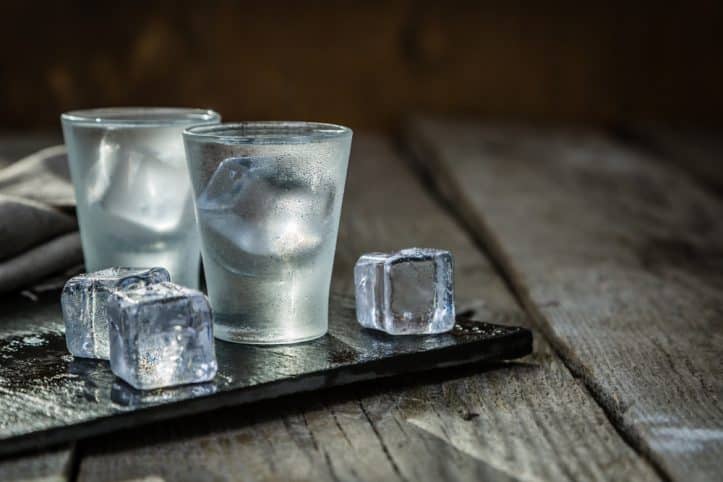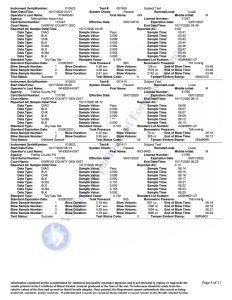Squeezing Gold from Breathalyzer Data for Virginia DUI Defense
Squeezing Gold from Breathalyzer Data for Virginia DUI Defense

Squeezing gold from breathalyzer data is essential for Virginia DUI defense
Squeezing beneficial data from breathalyzer / Intox EC/IR II data is what I do for all Virginia DUI defense cases. As a Fairfax DUI lawyer, I have repeatedly experienced the benefits of doing so. Analyzing and deconstructing this DWI breath testing data at first blush may not seem exciting, but then again cleaning one’s armaments may not seem exciting either, until a soldier witnesses how doing so makes for a more accurate shot that can better save his life against an attacking enemy combatant.
Obtaining the intelligence on the road to squeezing benefits from Virginia breathalyzer data
When a defendant accused of violating the commonwealth’s DUI law under Virginia Code § 18.2-266 meets with me for the first time s/he hands me the certificate of analysis for any post-arrest breath testing in the case. On the road to squeezing defensive benefits from this data, with that certificate of analysis, I obtain further data about the testing on the defendant, as well as the performance history of the particular machine itself, both by my sending an information request (here is a sample FOIA request from the DFS)from the Virginia Department of Forensic Science (DFS)) as well as obtaining data online.
How do I analyze Virginia DUI breath testing data in fighting a prosecution for driving under the influence of alcohol?
Analyzing the Virginia DUI breath testing data is essential on the path of squeezing defense benefits from that information. For this exercise in this article, I reference the October 17, 2020, 6:14 a.m. data for Intox EC/IR II machine instrument serial number 010523, found at the bottom of the page here, which also is displayed in the diagram to the right.
Further for squeezing benefit from Virginia DUI breath testing data, as provided by the DFS Intox/EC IR II Breath Test Operator Instructional Manual we use the lowest breath test reading that is obtained, which here is 0.137. We look for the DFS-admitted margin of uncertainty — found here for this machine’s certificate of instrument accuracy — which here is +/- 0.004. Forensic toxicological sense combined with the law of reasonable doubt advise to subtract rather than to add the margin of uncertainty. Therefore, the lowest reading of 0.137 minus a 0.004 margin of uncertainty = 0.133. We next look at the dry gas standard (a testing control device) value, which here is 0.100. We see that the check (CHK) of the dry gas standard is 0.99, so we use that differential that here is to the defendant’s favor, by adjusting the foregoing 0.133 value upwards by that 0.001 difference = 0.134.
How important is a mouth temperature challenge against Virginia DUI prosecutions?
Now we come to mouth temperature on the path of squeezing defense benefits in Virginia DUI prosecutions. The Intox EC/IR II breathalyzer machine assumes a mouth temperature of 34 degrees celsius, fails to account for higher mouth temperatures, and fails to test for and adjust for mouth temperature. Most people have mouth temperatures exceeding 34 degrees celsius. Particularly because our mouth temperatures change from hour to hour and day to day, and depending on whether and when we have consumed liquid, I advise my clients to get three successive mouth temperature readings completed immediately, coming as best as possible to these instructions that I have written in consultation with a forensic toxicologist.
Let us say that, taking a conservative approach in squeezing DUI defendant-beneficial data from the DFS information, the lowest mouth temperature reading is 35 degrees celsius. Henry’s Law and scientific study thereof says that one’s breath alcohol test reading falsely increases by 7 percent for each degree the mouth temperature falls above 34 degree celsius, which mathematically means to reduce by 6.5 percent from the foregoing adjusted mouth temperature reading for each degree that the mouth temperature exceeds 34 degrees. Therefore, in this instance, we subtract 6.5 percent from the foregoing .134 adjusted breath alcohol reading, to arrive at a rounded result of .125, which sounds like a more attractive number for negotiating a Virginia DUI settlement and for addressing any sentencing proceedings. Had the breath alcohol reading here been over 0.15, the final differential here would have been even greater, when considering the DFS-admitted +/- 0.008 margin of uncertainty under such circumstances, together with the higher number that results from multiplying the foregoing 6.5 percent once we deal with higher numbers.
Only one device is DFS-approved for breath alcohol testing in Virginia DUI cases
The Intox EC/IR II is the only DFS-approved breath alcohol testing device in Virginia DUI cases. In squeezing defense benefit from the DFS data, a Virginia DUI defense lawyer should always go to trial with this DFS list, found here and here (p. 334). It is ideal to print this summary page on the trial date, to preclude any question about whether this is the most up-to-date listing. Armed with this information, the DWI defense lawyer is ready to pounce on any inability of the breath technician to correctly name the device used for testing the defendant’s breath. Williams v. Virginia, 71 Va.App. 462 (2020).
Virginia DUI lawyer Jonathan L. Katz leaves no stone unturned in pursuing your best defense. Jon Katz will be delighted to meet with you for a free in-person consultation about your pending court case, at 703-383-1100.


